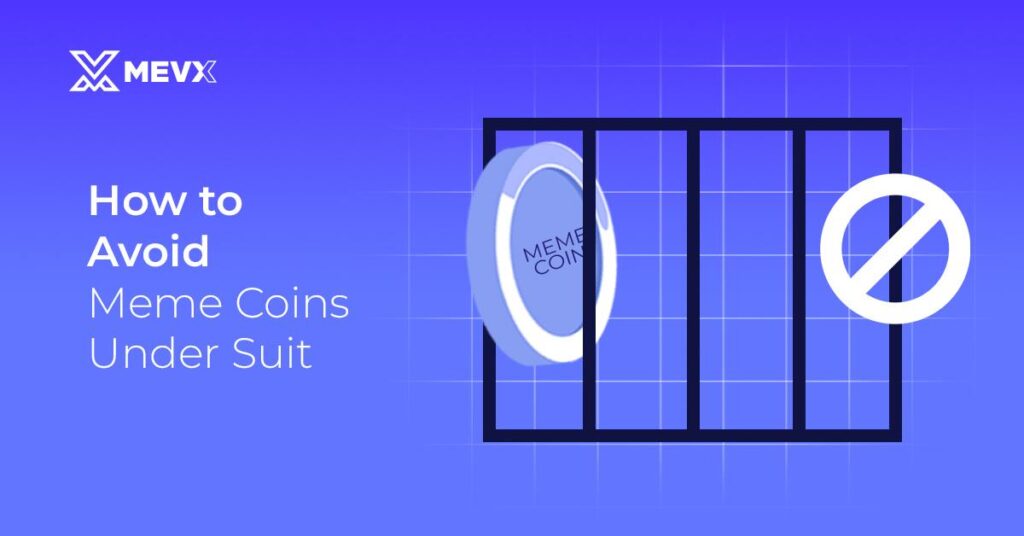Meme Coins Under Suit are becoming a hot topic as the crypto market grows. With fast gains come significant risks, including lawsuits and scams. This article explores the case of Hawk Tuah meme coin ($HAWK) and how to avoid such risky investments.

What Are Meme Coins Under Suit?
Meme coins under suit are cryptocurrencies in some kind of legal bind, usually because of fraud, securities laws, or other misleading practices. One such example is the Hawk Tuah memecoin ($HAWK), which recently became the subject of a lawsuit in the United States.
Investors claim that the makers of the $HAWK have been involved in fraud in the way they presented or promoted the coin as securities without being registered with the relevant body, the Securities and Exchange Commission (SEC), and after falling 90% in value, sustained major financial losses.
The lawsuit targets major defendants like Tuah The Moon Foundation, OverHere Ltd., founder Clinton So, and influencer Alex Larson Schultz. It claimed that the key defendants created a pump-and-dump scheme by raising the price of the token and selling it after building large holdings to leave unsuspicious investors in a loss.
This case reflects the broader challenges in the cryptocurrency market, where meme coins often rise to fame based on social media hype rather than intrinsic value or utility. Such legal actions bring up pressing concerns about regulatory oversight to protect investors from possible scams.
Legal Concerns and Industry Implications
The case of Hawk Tuah has raised much discussion around the lack of regulation over meme coins. Unlike mainstream securities, there is a lack of rigorous compliance matters that place them in some gray area when it comes to legal accountability.
Key issues raised in lawsuits against meme coins under suit include:
- Marketing as Unregistered Securities: The promoters often advance meme coins as investment opportunities, which thereby invokes the application of securities regulations.
- Pump-and-Dump Schemes: The wild swings in value, based on fake hype, often leave retail investors in the dust.
- Fraudulent Practices: Anonymous developers and opaque operations inflate the risk of fraud and financial manipulation.
The outcome of these class actions could set precedents that will help shape the future of regulations around meme coins under suit and the wider crypto market.
How to Avoid Meme Coins Under Suit
Investors can reduce some of these risks in meme coins and spot potential red flags by taking the following steps:

- Conduct Comprehensive Research: Research the project documentation of a meme coin, including the whitepaper, roadmap, and technological framework. Projects with clear goals and transparent operations are less likely to face legal issues.
- Verify Developer Credibility: Trustworthy projects generally have a verifiable development team with records of past accomplishments. Anonymous or untraceable developers are common traits of high-risk or fraudulent projects.
- Assess Liquidity Locks: Make sure the project has liquidity pools locked. Locked liquidity is a sign of commitment to the stability of the coin and reduces the possibility of a rug pull.
- Avoid Falling for Hype: Scammers very often count on Fear of Missing Out (FOMO) to attract investors into some doubtful projects. Never make any investment decisions based on hype on social media only.
- Monitor Price Patterns: Be wary of such meme coins showing rapid surges in price without fundamental changes. These are pretty indicative of pump-and-dump schemes.
- Utilize Risk Assessment Tools: Utilize platforms such as Webacy, Rugcheck, GoPlus, and DEX Screener to evaluate a meme coin’s safety profile. Red flags include high-risk scores, highly concentrated ownership, or other suspicious activity.
- Limit Exposure: Only invest a small portion of your portfolio in meme coins, typically no more than 2%. This diversification minimizes the impact of potential losses.
- Stay Updated on Regulations: Keeping tabs on regulatory updates could help investors understand which meme coins may be in legal trouble. It’s about understanding the ever-changing legal landscape to make informed decisions.
Broader Implications for the Crypto Market
The lawsuits surrounding meme coins have brought up a very important need for greater regulation within the cryptocurrency market. While decentralized and community-driven, meme coins need to employ higher standards of transparency to protect investors.
Meanwhile, these legal cases also underpin the perils involved in speculative investment in meme coins. In the absence of due diligence, investors may fall into the trap of scams, impermanent loss, and other pitfalls in this high-risk market segment.
The meme coins under suit indicate the dual nature of the meme coins: while lucrative opportunities are available, the risks are also huge. Legal actions against the Hawk Tuah meme coin indicate a weakness in the regulatory framework and a call for vigilance on the part of investors.
Elevate your crypto journey! Stay connected with the our blog for updates, analysis, and winning strategies!
Share on Social Media:
